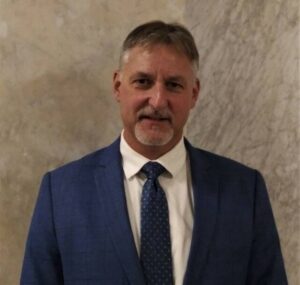A Luzerne County Council majority voted Tuesday to confirm county Manager Randy Robertson’s nominee for the vacant operational services division head position — Butler Township resident Greg Kurtz.
Kurtz will receive $94,500 annually in the position overseeing engineering, roads/bridges, planning/zoning, 911, emergency management, building/grounds, the boiler plant and solid waste management. The position has been vacant since Edmund O’Neill resigned in January.
“I appreciate the opportunity to bring the experience that I have gained over the years to benefit Luzerne County,” Kurtz said after the vote.
According to a handout from human resources, Kurtz has worked as director of operations for nine years at CAN DO Inc., an economic development agency covering the county’s southern half.
In this position, he has been overseeing the agency’s utilities and facilities division and serving as project liaison with architects, engineers, contractors and municipal representatives. He is responsible for the budget, planning, administration and expediting of all agency building construction, land development and other facility, utility and industrial projects, it said.
Kurtz has a degree in mechanical engineering technology and more than 30 years of experience in facility management, project administration, machine design, manufacturing engineering, maintenance support, land development and construction management, it said.
Previously the mayor of McAdoo borough in Schuylkill County from 1998 to 2002, Kurtz also currently serves on the board of directors for CTC Manufacturing, a not-for-profit company that employs disabled individuals, it said.
Kurtz is a member of Holy Trinity Orthodox Church in Wilkes-Barre. He and his wife of 36 years, Cathy, have three adult children and four grandchildren.
Councilman Tim McGinley unsuccessfully attempted to table the confirmation, saying he had major concerns about the way the request was proposed.
Several council members had said the nominee’s information should be publicly disclosed in advance, but Robertson has said he is concerned about jeopardizing the current employment of nominees if they are not confirmed. He personally contacted each council member to discuss his nominee.
Only three other council members supported McGinley’s tabling motion — Stephen J. Urban, Gregory Wolovich Jr. and Kevin Lescavage.
Councilman Brian Thornton then unsuccessfully proposed an amendment to reduce the compensation to $91,087, which was the amount that had been budgeted for 2022, instead of the $94,500 proposed by Robertson.
The compensation remained at $94,500 because only four others supported Thornton’s amendment: Urban, Wolovich, Carl Bienias III and Lescavage.
In the final vote, seven council members supported the confirmation: Bienias, Vice Chairman John Lombardo, LeeAnn McDermott, McGinley, Matthew Mitchell, Chris Perry and Chairwoman Kendra Radle. Voting no were Thornton, Urban, Wolovich and Lescavage.
McGinley paused at length before his vote in support, saying he had tried to table the confirmation because he met Kurtz for the first time in executive session before Tuesday’s meeting. He added Kurtz “appears to be a fine person.”
Many applauded when the confirmation was approved.
Drop boxes
The meeting opened with an inquiry from Thornton on why Radle did not place his proposed mail ballot drop box ban ordinance on the agenda.
Radle said she followed the county law office opinion that the ordinance mirrored one rejected by a council majority last month, which meant the matter could not be reconsidered at this time unless a request was made by one of the six in opposition. All six said they are not in support of revisiting the drop box matter.
Thornton vehemently disagreed the ordinances are the same, saying his is an outright ban while the prior one would have stopped county funding and staff from delivering the boxes to locations approved by the independent citizen election board.
The law office has indicated the effect of the first ordinance would have been the same because the only option would have been for election board members to deliver the boxes themselves, which would have been a liability issue. County attorneys have said the election board has authority to decide if drop boxes are used in the county — not council.
Thornton said his ordinance is “entirely different,” described the law office’s reasoning as “flawed” and said he strongly urges Radle to place the matter on the agenda so the issue of bringing the matter to a vote does not have to be dealt with in court.
Comparing Radle’s decision to a “oligarchy,” Thornton said he understands there are other pressing issues but said the division over drop boxes is “not going away.”
Perry said he fully agrees with Radle’s decision in following advice from the law division, saying “they’re lawyers.”
Lombardo said council spent multiple meetings discussing and hearing public input on drop boxes and said the proposed ordinance will lead to litigation.
McGinley said it’s clear the election board controls the drop box decision and reiterated council should not be disrupting the election bureau’s efforts to prepare for the Nov. 8 general election less than two months away.
Siding with Thornton, Urban said the first ordinance, which he had proposed, was different and argued any council members have a right to bring forth an ordinance at any time.
“We also have a fiduciary responsibility to not move forward with unnecessary litigation,” Radle replied.
Eight of 11 council members ended up voting on the agenda adoption, which did not include Thornton’s ordinance.

